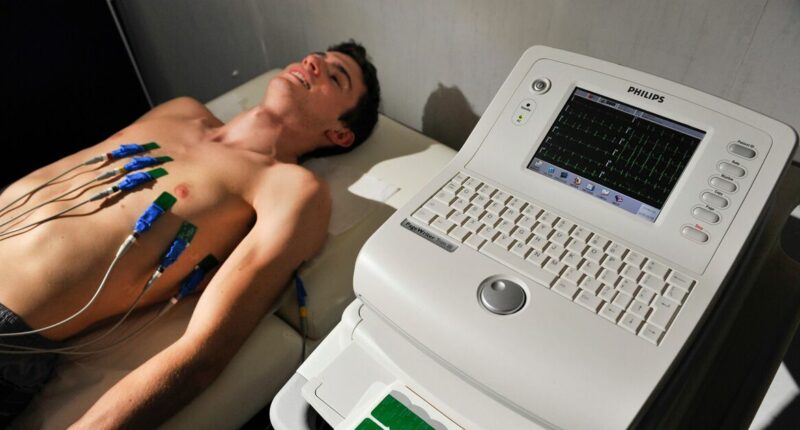Share this @internewscast.com
During training for his major race of the season, athlete Scott Owen received an unexpected diagnosis. The skilled endurance runner, aged 15 at that time, discovered he had a potentially severe heart condition that could result in sudden cardiac arrest if not managed. Remarkably, the condition was only identified by chance.
Scott’s mother, Gail, had learned about a heart screening event specifically for young individuals occurring near their home in Portadown, Northern Ireland. In October 2023, she ensured Scott, along with his two older brothers and younger sister, participated in the event, joining 100 other youths for the screening. The decision proved fortuitous, possibly saving Scott’s life.
“Honestly, there were no indicators or family history of heart problems, so we had no concerns prior to the screening,” remarks Gail, who works as a school classroom assistant and is married to Kyle. “Learning there was something wrong with Scott’s heart was a huge surprise, considering he was fit, healthy, and consistently running at a high level. We were all taken aback.”
The screening was facilitated by the UK charity Cardiac Risk in the Young (CRY), which conducts mobile screening events at community centers and sports clubs across the UK. Most of CRY’s screenings are funded by families who have suffered a young, sudden cardiac death, making them free, along with those at its national screening center in Surrey.
During the sessions, experts use an electrocardiogram (ECG) to painlessly record the heart’s rhythm. Abnormalities are flagged and examined further. In Scott’s case, Gail was contacted after his screening, revealing a potentially serious problem. It was later diagnosed as Wolff-Parkinson-White (WPW) syndrome, caused by an electrical fault that makes the heart beat too rapidly.
Gail admits they were unfamiliar with the condition. As the news settled, she says the family faced another challenge. “While Scott was shocked about his heart, his main concern was whether he could compete in a district schools cross country race,” says Gail. Achieving success there would allow Scott to qualify for the Ulsters, a celebrated annual regional championship.
“I remember sitting down with the family after he’d been diagnosed and saying, ‘Well do we let him run?’, as I knew how important this race was to Scotty.” After much anguish, they finally decided he should run. On race day in January 2024, Scott won his age-category race for his school, and felt fine. Yet despite his victory, he sat out his place on the start line for the Ulsters while awaiting his heart surgery.
In March 2024, he travelled to Dublin with his dad Kyle to undergo ablation therapy. Under a general aesthetic, an incision was made in his groin and a catheter passed through blood vessels into the heart. Using heat (it can be done by freezing) the area of the heart causing the irregular rhythm – known as an arrhythmia – is destroyed using the catheter.
“When I was in the waiting room on the day of my surgery I began getting worried,” admits Scott, who is now 17. “But after being put to sleep, the next thing I remember was waking up in a hospital bed and told everything was fine. I was relieved it had been sorted.”
Scott had two weeks off school recovering. He suffered no discomfort around his heart but only where the incision was made in his groin. The procedure was successful and requires no further treatment. After regaining full fitness, he returned to competitive running for his club Lagan Valley AC last autumn, although he admits missing the entire track season was “tough”.
But his family knew that sacrifice was worth it. Since being founded 30 years ago, CRY has screened an estimated 330,000 young people aged between 14 to 35. Of those, more than 1,100 were found to have potentially life-threatening conditions – while 3,000 have been identified with less serious issues that still require monitoring or treatment later in life. On average, 12 young people in the UK every week die from a previously undiagnosed heart condition, the vast majority without showing any symptoms beforehand. Although doing sport will not cause sudden cardiac death, it has been shown to increase a young person’s risk if they have an underlying condition.
It means that often stories of “sporty” people unexpectedly dying or suffering a cardiac arrest while doing what they love still make headlines. For example, when footballers Fabrice Muamba and later Christian Eriksen collapsed on the pitch, the charity says demand to book screenings surged.
Despite CRY screening about 30,000 young people annually, the waiting list has soared to 120,000 – and is rising. The charity is continuing to build support among MPs with its call for all young people to access free, expert cardiac screening. Currently the UK National Screening Committee doesn’t recommend this, which CRY’s CEO, Dr Steven Cox, questions.
“An ECG is one of the most powerful tools in cardiology,” says Dr Cox. “It can identify people like Scott with conditions which would never normally be picked up before then treating, managing and curing them.”
He adds: “We also don’t accept the number of deaths is small, meaning it’s rare. We know the official figures only represent less than 10% of all young sudden deaths, so the true numbers are much higher. When a young person dies in a community, it has a horrendous impact on their family, friends, school and colleagues. The money raised in response to that – about £5million last year – by the community is to fund more screenings to prevent more deaths.”
Dr Cox says that, in Italy since 1978, all young people engaged in sport are screened which has reduced sudden cardiac death among them by 89%. For his part, Scott is still achieving new personal bests and winning more medals. He and his family are keen to encourage others to get screened. His own experience meant his running club raised £2,000 to support CRY’s ongoing work.
“We’re urging parents to get their kids screened too,” says Gail. “When people see someone young like Scotty who’s been running for years has a heart condition, it makes them think it can happen to anyone.”












